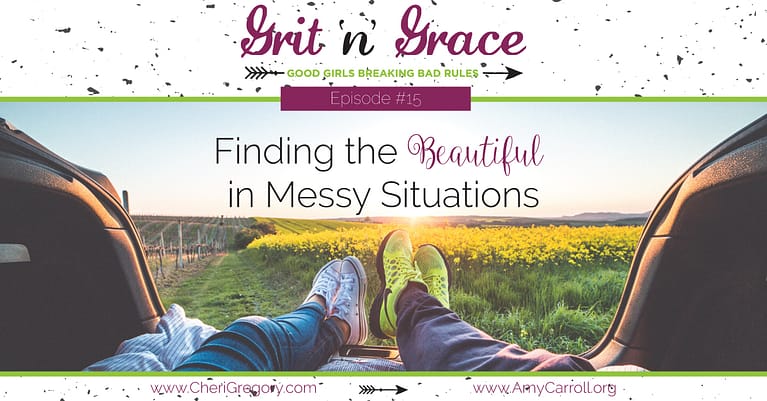
Amy and Cheri dive deep into the hidden strengths of Highly Sensitive Persons. Amy opens up about her experience as a mom raising an HSP son. Cheri discloses a sneaky misconception about HSP’s and reveals the strengths locked inside. You’ll also receive practical insight into how your strengths can be used in the world in a powerful way. God made you on purpose for a purpose. Find out what it is!
(This page contains affiliate links. Your clicks and purchases help support Grit 'n' Grace at no extra charge to you.)
Recommended Resources
- Sensitive & Strong by Denise Hughes and Cheri Gregory
- Are You a Highly Sensitive Person? self-quiz
Downloads
Your Turn
- How would you define “sensitive”? Is it “fraught with baggage, like a traveler that doesn’t know how to pack light,” as Cheri would say?
- Which one of the five qualities of an HSP feel familiar to you? Do you see them as strengths or weaknesses? (1) Depth of processing; (2) Overstimulation; (3) Emotional reactivity; (4) Empathy; (5) Sensing the subtle
- What gifts do you as an HSP or someone you love who is an HSP have to offer?
Transcript — scroll to read here (or download above)
****
Grit ‘n’ Grace: Good Girls Breaking Bad Rules
Episode #176: The World Needs Your Gift of Sensitivity
Cheri:
And turn on the call recorder. Okay. Do you want to start or do you want me to start?
Amy:
Oh, I’ll ask you the question. Okay. So Cheri, when I say the word sensitive, what do you think of?
Cheri:
I think of the word wimpy. Oh, well that’s the first thing that comes to mind. I mean, I’m sorry to admit it. Having written a book called Sensitive and Strong, I know that the word association game was supposed to lead me to say strong, but you know, the way I grew up sensitive was a weakness and was something to be ashamed of. How about you?
Amy:
Well, I mean, I do have sort of a similar negative, uh, word that goes with it. I are a term that goes with it is crybaby because I have always, been, I cry easily. I say I cry at Hallmark commercials. Those Folgers’ commercials at Christmas get me every time, but then I also, I mean, I really and truly cry a lot at lots of different things. And so, that tendency towards being the crybaby has always been a little hard.
Cheri:
I think, I just think that in so many situations where the whole, of course in the ‘80s, there was this thing, and some of our listeners might remember this. There was this whole thing about the sensitive man. It was just kind of like this whole movement about the sensitive guy. And you know, it was just fraught. It was just. It’s a word that’s fraught. Can I just use that word? Fraught. It’s just.
Amy:
I love the word fraught, yeah.
Cheri:
We’ll just use it: Fraught, fraught, fraught. It’s got so much baggage. You know, it’s like a traveler that doesn’t know how to pack light. That’s the word sensitive.
Amy:
I love that. That’s the perfect picture.
Cheri:
Well, this is Cheri Gregory.
Amy:
And I’m Amy Carroll.
Cheri:
And you’re listening to Grit’n’Grace: Good Girls Breaking Bad Rules. The podcast that equips you to lose who you’re NOT, love who you ARE, and live your one life WELL.
Amy:
Today, we’re discussing what we’re learning about being sensitive and strong. So Cheri, there is so much misinformation about highly sensitive people. HSPs is how we’ll refer, we’ll use the abbreviation. There’s so much misinformation swirling around the Internet about this idea. One of them that I just really, it kind of gets under my skin, is the whole deal about empaths. So, implying that HSPs are automatically empaths and the only real empath I’ve ever seen was like on a Star Trek episode.
[Laughter]
Do you even want to debunk any of that or talk about any of that?
Cheri:
Here’s what I do want to be clear of as we’re starting this particular episode. They’re — I have noticed in the years that I’ve been studying being a highly sensitive person and have kind of moved into this role of evangelist. And the number of women that God has brought into my life, when, and I’ll be like, “Why am I talking to this person? Why are they telling me their life story?” And about an hour or two into it, I’ll be like, “Oh, I know.” You know, my little spidey-senses, my little HSP senses will be, but I’m not an empath. Let’s be clear. I’m not pretending to be an empath here. It’s just the signs are starting to line up. And the number of them, that if I say, “Hey, have you ever heard about being a highly sensitive person?”
And Amy, I kid you not, they shudder, like, they just like convulse at the word sensitive. And they’ll react in horror, like; they’ll put their hands up and scoot back. And I’m thinking of one particular friend, who I even gave her my laptop. We were at Starbucks, and she took the little, the assessment and she was horrified. She was like, “I can’t, I can’t be that.” And I’m like, well, why? It’s been so baffling because for me it’s been such good news. And she started describing the person in her family that she thought was the epitome of a highly sensitive person, and this person was self-centered and demanding and they canceled out of everything and they needed special treatment and they were entitled. And they were, did I already say that they were whining? If I didn’t, I’ll say it. If I did, I’ll say it again. If I didn’t, well, there you have it. And they were over the top, reactive.
And I was like, “Oh, no, no, no, no, no, you’re not describing a highly sensitive person.” Let’s be really clear here. And it bothered me for weeks. I had to think about it. It finally occurred to me, she was describing a narcissist. She wasn’t describing a highly sensitive person. And, she was like mixing these two up, as if, as if this person in her life, the narcissist, was her definition of what it would be to be a highly sensitive person. And so, I finally realized the clue of, with, whether or not you are an HSP versus a narcissist. First of all, so much of what I just described does not describe an HSP, but also an HSP isn’t — if you’re worried that you might be a narcissist, you probably aren’t one. Because by definition a narcissist doesn’t care if they’re…
Amy:
What you think. Yeah.
Cheri:
What you think. So anyhow. One of the most exciting things we have been seeing on the launch team, for Sensitive and Strong, is this sense of relief that most women are feeling that it’s okay to be sensitive. It’s doesn’t have all of these, other fraught things that don’t have to be attached to it. And it’s not a mistake that they’re highly sensitive, that God made them this way on purpose for His purpose.
Amy:
I love that. Say that one more time. God made them…
Cheri:
On purpose for His purpose.
Amy:
So good. That really is so helpful. And, you know, I have a son we’re going to talk about in just a minute that is an HSP, and he had the same reaction as you, Cheri. You’ll be happy to know that he was so happy to understand his wiring better and understand some of the things that had made him feel bad about himself in the past and that he didn’t understand in the past. So like you, he loves the label. I don’t know if that’s what we want to call it. The title!
Cheri:
There you go. Well, it’s an understanding. It’s an understanding that says, “Oh, now that I have this information, I can make really, really wise decisions moving forward.” So I did want to just briefly go through the five key qualities of an HSP since I’ve just heavily defined it as not being a narcissist. Here’s the five, the five defining characteristics. The first one is depth of processing. We need time to process and this is where I think you have one foot definitely in the HSP camp. In fact, I think that’s why we’ve continued doing Grit and Grace all these years and don’t see an end in sight is because we do like taking the time to process. What do you call it? Living an examined…
Amy:
Living an examined life, but also, I always tell people I don’t think fast on my feet and I always saw that as a liability, but now I’m seeing it as a strength.
Cheri:
And then the second one is overstimulation. We talked about that last week with the five senses being overstimulated by that. Emotional reactivity and somebody like me is more likely to express it outwardly. Whereas someone like Denise is more likely, to feel it, but not express it outwardly. And, then, empathy, which is not the same thing as being an empath. Let’s be clear about that.
Amy:
Right? They’re similar. Empathy is that we feel the emotions that other people feel, but it’s not as quite as woo woo as empath.
Cheri:
And you are highly empathetic.
Amy:
Well, I am, and I think this is one of the ways that you knew that I was at least, you know, on the spectrum of HSP, ‘cause there is a spectrum, which is interesting.
Cheri:
Continuum, let’s call it a continuum.
Amy:
Oh, okay. On the continuum of HSP, because there is a continuum, and I’m kind of, you know, when I took the test I was kind of borderline. But you knew, because every time we do an interview I at least tear up, and sometimes, I’m close to sobbing. There are times when we’re doing an interview that I just want to put my head down and have a good old cry.
[Laughter]
Cheri:
So that’s depth of processing, overstimulation, emotional reactivity, empathy. And then the fifth one is sensing the subtle. We notice nuances. So, all right, I would love to have you describe for our listeners what it was like being the mom of an HSP child.
Amy:
Well, I didn’t have a name for it back then, and I didn’t completely understand it. So there were some issues with it. Here’s an example of one, just one way that it played out in our lives. I went to a Wednesday morning Bible study that I dearly loved. It was a group of women from churches all over Burlington, North Carolina. We got together on Wednesday mornings and one of the beautiful things about it was that the hostess had a great big basement where the kids played, and we had childcare. Oh cool. So Nolan loved it. He would go with me every week, and he would love playing with the other kids. And we had no problems until one day someone hit the garage door opener. Now, we didn’t live in a house with a garage, so that was not a sound that Nolan was used to. And Nolan was extremely, extremely sensitive to sound.
We couldn’t go to movies. We couldn’t be in rooms where a balloon was because it might pop. We — so it was — I mean, I could list and list and list, but this particular time it was the garage door opening. It startled him, and he refused to go back. He was probably two or three. He was little.
Cheri:
Oh, wow.
Amy:
And so, suddenly my beloved Bible study went by the wayside —
Cheri:
Oh, dear!
Amy:
because my child — it didn’t take, I’m surprised we even figured it out. Thank goodness the childcare provider realized what it was, you know, that had scared him so badly. So, we went through a process that we went through with him time after time after time with different things. So Nolan, I packed him in the car. We rode around neighborhoods. We looked at garage doors. We talked about garage doors. We talked about what people have in their garages.
We talk about how garage doors go up and they go down, and when they go down and up they make a really loud noise. And we talked — I mean, weeks of driving around neighborhoods during the afternoon, sometimes before naps and talking about garage doors. Then, finally, we went to his grandmother’s house. We went up to the garage door, we talked about the garage door, we touched the garage door, and then we went inside the garage, and I let Nolan push the button for the garage. And then he was fine, and he went back to Bible study. So, okay, that’s one of, I could list probably 10 or 20 things that we had to do this process with. So I knew enough as an educator to know that I had to desensitize my child to these things, but I didn’t know what the root of it was.
And I think back to Jill Savage, when we interviewed her, she described her husband and her child who are HSP that before she understood what HSP was. In that it’s a scientific, biological DNA thing. She said, “I would’ve described them as so dramatic.” And, you know, in my head, really, that was kind of the label I put on Nolan. It makes me tear up to think about it, because I didn’t have an understanding of why it was happening. And so, instead of approaching it as a creative challenge, I saw it as an annoyance. And I’m very sad about that. I’ve been very heavyhearted getting ready to talk about this, because I wish I had had the book Sensitive and Strong when Nolan was a little boy.
Cheri:
Okay. So I’m just sitting here watching my, my midway highly-sensitive fan weep about her history with her decidedly definitely highly-sensitive son. But what I want to say is, oh my goodness, what I hear you doing this this beautifully sensitive process. Even if you found it irksome, you didn’t punish him as if he was defiant and that was huge. You know, he was of an age that you could have looked at that as rebellion and you could have come down very hard on him rather than recognizing that there was a fear or anxiety aspect to it. So I know you carry the weight of not having responded the way you now know you would have if you had known more. But I’m listening to you driving around week after week after week. Girl! There was a lot of patients in that.
Amy:
Yeah. But full disclosure, kids pick up on things.
Cheri:
Yeah.
Amy:
And I think he felt like something was wrong with him. Yeah. Yeah. Sadness, anyway, but thank you for that.
Cheri:
All right. All right, well.
Amy:
The research has been out for more than two decades, so 20 years of research being circulated about HSP. So why do so many people still not know that being an HSP is a real thing?
Cheri:
Well, you know, as we were kind of playing around earlier, there’s just so much misinformation. There’s so many interpretations of the word sensitive. When I first started writing and ministering to highly sensitive Christian women and I surveyed them, only a third of them thought the word could even be possibly positive. A third thought it was more negative. And then everybody else was kind of like, well, we don’t know. We just avoid the word. There’s a lot of shame and secrecy around it, but the fact that every HSP kind of has their own constellation of sensitivities makes it hard to find community. Like, you and Nolan both have this in common and yet in a different way. Like, because he was so sound sensitive and that might not have been something that would necessarily have been something that would have triggered you. You had the sensitivity to know something was wrong, but you weren’t able to just immediately go. Yes, I know for sure what it is in every situation.
I was once, many years ago, I was speaking at a juvenile diabetes, uh, sorry, luncheon for, it was a fundraiser for juvenile diabetes research. And there were quite a few children there who had diabetes, and of all things, the hotel was running late for lunch. And so, we were all waiting outside the hotel ballroom to be allowed in. And you know, five minutes late, 10 minutes late, 15 minutes late. And, suddenly, I noticed that every parent of a child was doing the exact same thing. They were all doing, they were opening up little kits they had brought with them and they were doing blood testing kind of stuff and sugar glucose testing and they were eating snacks or whatever.
I mean, I don’t remember the exact details. I just remember being suddenly aware that the exact same thing was happening with all the children at the same time. That will never happen for highly sensitive persons. Like, the illustration I tend to use as you could. You could have two highly sensitive people sitting next to each other in church and one of them is getting a headache because the drummer is extra loud this week. The other one is getting a headache because of the perfume that the woman in front of them doused all over herself and they both are having, kind of, a highly sensitive reaction because of the overstimulation, but they would not be able to turn to each other and go, “I know it’s kind of hard right now. Isn’t it?” Because one of them is having the auditory overload and the other is having the scent overload.
And so, it can be very, very isolating, because everybody has a slightly different reaction. And so, rather than being able to, you know, text or call or gather with a group of friends and say, “Okay, you are my people. You understand me.” We end up feeling very much like misfits as if we’re all alone in this.
Amy:
Well, I think one of the remedies, I’m just gonna do a shameless plug here, since this is not my coauthored book with you, one of the remedies is to buy your book. No joke listeners, because you and Denise have covered this so comprehensively. And I mean, correct me if I’m wrong, but I think this is the only book about HSPs that I know of that has the Christian perspective.
Cheri:
At this point we think it is the only one on the market. We wrote the book that we wish we had had all along, and the book that we want to be able to share. And, you know, people like Kathi Lipp, who is self-proclaimed not a highly sensitive person, you know, it’s the book that she’s going to be able to feel comfortable passing out.
Amy:
Yeah. Well, but we all need the book because we all either are HSP or we love someone who’s HSP. And so, I wish I had had it for both reasons actually.
Cheri:
Yeah, absolutely. So, from your perspective, what gifts do you see that highly sensitive persons have to offer others? You know, we ended up talking about the downfalls so much, the things that were too much this or not enough that. So as we wrap up here, let’s focus on what some of the strengths, some of the gifts are.
Amy:
Well, I think that heightened empathy is a gift. And I’m watching this in Nolan’s life because he’s a newlywed. He’s a new husband, and his heightened empathy towards Madison, his wife, is the most miraculous, wonderful, beautiful thing to watch. And I know that it has to be one of the reasons that she chose Nolan, because he is so in tune to how she feels and cares so much about how she feels. So that’s beautiful.
I really have come to appreciate the fact that I’m a processor. Like I said, I would have loved to have been one of these people that can think fast on their feet, but I’m a pretty good problem solver given the time. I can come up with pretty good solutions to things. Here’s a silly example, but, I had an electrician, we had an old house when we lived in Burlington, I had an electrician come in. We had no fan in our bathroom, in the South that is like the kiss of almost literally death ‘cause you will have mildew, right? You have experienced this recently, Cheri, mildew in the South. And so, he came in, he’s looking, he’s like, I just don’t know how to do this. And I said, well, I’ve been thinking about it and this is how I think it can be done. And he looked at me with pure amazement on his face. He’s like, you’re right. But, see, I had been thinking about that thing for months, you know, so processing is a superpower.
Cheri:
Well, and you know, we, I think sometimes we revere the person who can make the snap judgment, but personally, I like going on the journey with someone like you who takes the time and then takes me along the journey of the process along with you. So yeah, I love that.
Amy:
Well, and you’ve identified, Cheri, a particular role that many might assume that they are unsuited for. Many HSPs might think, “Oh, I’m disqualified from this.” But tell us about the role that you think that they are especially qualified for.
Cheri:
Yeah. Well, and I had this told to me a number of years ago, and the role is leadership. And I was actually talking with a mentor of mine, and she just kind of blithely said, “Well, maybe HSPs just aren’t made of leadership material.” And my first response was that my heart sunk because at the time I was working on a Masters in leadership. And I’m still slowly processing my way through a PhD in leadership. But then it, you know, something awoke in me, and I was like, “How dare she?” I’m going to prove her wrong. I think I’m made of some kind of leadership material. And so, in studying the leadership theories, there is what we revere — well, we have in American society revered charismatic leadership, and but there is another type of leadership that highly sensitive persons, I think, are really well suited for naturally. And that is servant leadership. It’s the kind of leadership that was modeled for us, of course, by the ultimate servant leader, which would be Christ.
And so, where charismatic leaders tend to expect respect, a servant leader exhibits humility. A charismatic leader is seen as larger than life. A servant leader lives authentically. A charismatic leader accepts themself. A servant leader is more likely to focus on accepting others. Charismatic leader is driven and determined. A servant leader provides direction. A charismatic leader benefits from hierarchy. A servant leader engages in stewardship. A charismatic leader focuses on results. A servant leader develops and empowers people. And one of the other qualities of leadership that is so important is emotional intelligence. And I know we’ve talked about EQ before and the highly sensitive person has at least two of the qualities of EQ in spades. And that’s going to be self-awareness and empathy. And so, we come prewired for certain kinds of leadership. Now, does that mean we’re automatically wonderful, amazing servant leaders?
No, I mean, leadership is a skill. It’s not just something that’s inborn. But I talk to enough HSPs who feel like they’re just completely disqualified. And I’m like, no, no, no. We need you. We need the leadership style and the leadership gifts that you have.
Amy:
That’s beautiful. Well, you’ve picked out a beautiful verse that really kind of is a bookend to that topic of servant leadership. Tell us what the verse is this week, Cheri.
Cheri:
Now, this really is the founding verse that we used as the foundation of Sensitive and Strong. It’s Isaiah 64:8. And it says, “Yet you Lord, are our father. We are the clay, you are the Potter; we are all the work of your hand.”
And the focus here is that God is the one who decided to create as the way he did. And, you know, whether you’re a highly sensitive person or not, how he created you is based on his plan and his omniscience.
And for us to question it or to try to dictate or to regret, it’s a waste. And I think that’s one of the reasons why learning that I’m an HSP and learning that it’s a real thing has been so freeing is it’s made me realize, wow, I really can trust that God knows what he’s doing. I mean I know I should have all along. But, you know, once again, science proves what’s been in scripture all along. God knows what he’s doing. We can trust him and we can know that what he has done and what he has planned. Like I said earlier, he made us on purpose for a purpose, whether we’re HSP or not.
Amy:
Beautifully said. So the bad rule that just negates all the things you just said is that HSPs are too sensitive. But the fact for focus is that HSPs are a gift that God has given to the world.
Cheri:
Yeah, I love that.
Amy:
On purpose for a purpose. I love that.
Cheri:
That’s right. Absolutely. And you know, I think one thing that Denise would want me to add in here, for sure right now, is that we’re not saying we have super powers. We’re not saying we’re a greater gift to the world than any other personality. But like every unique individual and every unique personality, we are a gift. It’s not something to be ashamed of. So, for me, the grit in all of this is believing that that’s true. Because, you know, I’ve got all these years or programming around that fraught word sensitive. And so it is still my natural default to be like, “Oh, there’s something wrong with me. I’m so defective.” And so, the grit is to go with my brain, to go with what I know in my head because it still hasn’t traveled all the way to my heart and to hold on and to believe it until I feel it. What is the grace for you?
Amy:
Well, I’m having to give myself grace for what I didn’t know when I was mothering Nolan when he was young. And the further grace of this all is God putting me with you. And so, you’ve been teaching me over the years about what it means to be a highly sensitive person, and I pass that on to Nolan. And so just like, it’s funny. I hadn’t put it together until just now, but just like Anson, I passed on my perfectionism to him in spades and we’ve been working through getting rid of that perfectionism. And Nolan and I have been working through together a lot what it means to be HSP and how to give that as a gift to the world.
Cheri:
I love it. All right. That’s a wrap. We hope you’ve enjoyed episode 176 of Grit and Grace: Good Girls Breaking Bad Rules.
Amy:
Hop on over to our website, GritnGraceGirls.com/episode176. There you’ll find our transcript, this week’s digging deeper devotional, a printable resource that helps you to apply what you’ve learned in this episode, and links to the Sensitive and Strong book site.
Cheri:
We’ll be continuing this conversation over in our Facebook group. If you’re not yet a member, just search Facebook for Grit N Grace Girls and you’ll find us.
Amy:
Next week [Episode 178], we’ll be talking with Kelly Needham, author of Friendish.
Cheri:
for today. Grow your grit, embrace God’s grace, and when you run across a bad rule, you know what to do. Go right on ahead and…
Amy ‘n’ Cheri:
Break it!
You’ll never miss an episode when you sign up for weekly updates!









